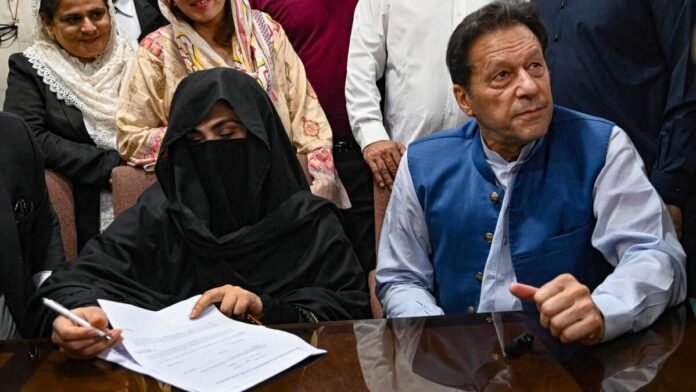In a stunning turn of events, former Pakistan Prime Minister Imran Khan and his wife Bushra Bibi have been sentenced to 14 years in prison in connection with the Toshakhana case, a verdict that has sent shockwaves throughout the nation. The judgment, delivered by an accountability court, marks a significant moment in Pakistan’s political landscape and has ignited a flurry of reactions from various quarters.
The Toshakhana case revolves around allegations of illegal use of state-owned luxury vehicles and gifts by public officeholders, including former prime ministers. Imran Khan and his wife Bushra Bibi were accused of receiving luxury vehicles and other valuable items as gifts from foreign dignitaries and not declaring them, thereby violating Pakistan’s laws on asset disclosure and misuse of public resources.
The court’s decision to convict Imran Khan and his wife Bushra Bibi sends a strong message about accountability and the rule of law in Pakistan. It underscores the principle that no one, regardless of their stature or position, is above the law. The judiciary’s impartiality and commitment to upholding justice have been reaffirmed through this verdict, bolstering public confidence in the country’s legal system.
Imran Khan, a former cricketer-turned-politician who rose to power on promises of fighting corruption and bringing about accountability, now finds himself on the other side of the judicial process. The irony of a leader who campaigned on anti-corruption rhetoric facing corruption charges is not lost on the Pakistani populace. The case serves as a sobering reminder of the complexities and challenges inherent in governing a nation, where ideals often collide with the realities of power and politics.
For Imran Khan’s supporters, the verdict comes as a severe blow, casting a shadow over his legacy and tarnishing the image of the political party he leads. Many had placed their hopes in Khan’s leadership, believing him to be a beacon of change in Pakistan’s tumultuous political landscape. However, the conviction has sparked disillusionment and raised questions about the sincerity of his anti-corruption crusade.
On the other hand, critics of Imran Khan’s government view the verdict as a vindication of their long-standing allegations of corruption and mismanagement. They argue that the ruling serves as a validation of their concerns regarding the lack of transparency and accountability in the administration. For them, the conviction of a former prime minister is a significant victory for democracy and the rule of law.
The sentencing of Imran Khan and Bushra Bibi to 14 years in prison has far-reaching implications for Pakistan’s political future. It not only raises questions about the leadership of Imran Khan and the future of his party but also creates a vacuum in the country’s political landscape. With general elections looming on the horizon, the verdict could potentially reshape the dynamics of Pakistani politics, paving the way for new contenders and alliances to emerge.
As Pakistan grapples with the aftermath of the Toshakhana case verdict, the focus now shifts to the legal proceedings and potential appeals that may follow. The defendants have the right to challenge the court’s decision, and their legal team is expected to explore all available avenues to seek redress. Meanwhile, the broader implications of the verdict on governance, accountability, and the rule of law will continue to reverberate across Pakistan’s political spectrum for the foreseeable future.
In addition, the sentencing of former Prime Minister Imran Khan and his wife Bushra Bibi to 14 years in prison in the Toshakhana case represents a watershed moment in Pakistan’s political history. It underscores the judiciary’s commitment to upholding accountability and the rule of law, while also raising questions about the future trajectory of Pakistani politics. As the nation navigates through this turbulent period, the verdict serves as a stark reminder of the challenges and complexities inherent in the pursuit of justice and governance.

